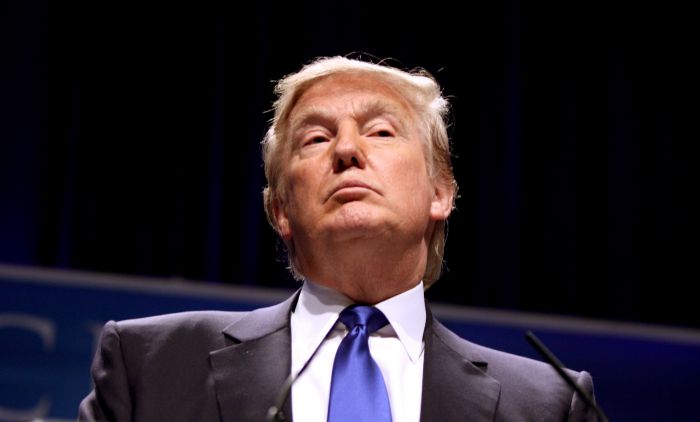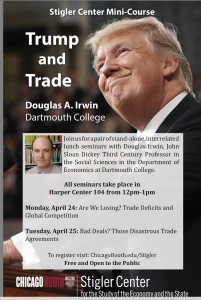Where does the president stand on trade and can a global trade war be prevented? Dartmouth professor and trade expert Douglas Irwin holds two stand-alone, interrelated lunch seminars at the Stigler Center, in which he’ll examine Trump’s trade policies and the threat that the wave of rising nationalism around the world presents to global competition.
Where does President Trump stand on trade? Throughout his campaign, Trump spoke vehemently against free trade agreements, promising to renegotiate NAFTA (“the worst trade deal in history”) and pull out of the Trans-Pacific Partnership (TPP), which he did shortly after starting his term. In his inauguration speech, Trump vowed to pursue a protectionist, anti-trade agenda that will “protect our borders from the ravages of other countries making our products, stealing our companies, and destroying our jobs.”
Since then, some commentators have noted that the president seems to have softened his position on trade. Despite his promises to lead an “America first” agenda and concerns that he’ll start a trade war with China, Trump seems to have altered his stance, going back on his previous labeling of China as a currency manipulator, and subsequently defending this reversal by saying: “What am I going to do? Start a trade war with China while in the middle of him [Chinese President Xi Jinping] working on a bigger problem, frankly, with North Korea?” Trump said. “So, I’m dealing with China with great respect. I have great respect for him.” Some commentators have already suggested that Trump might also soften his stance on TPP.
This week, Trump once again reiterated his bashing of NAFTA, calling the agreement “a complete and total disaster” and promising to make “big changes” or withdraw from it completely.
In the latest issue of Foreign Affairs, Dartmouth professor Douglas Irwin writes that Trump’s “brand of economic nationalism is just one step away from old-fashioned protectionism.” Despite the president’s promises that protectionism will usher in a new age of “great prosperity and strength,” argued Irwin, the president’s “America first” trade policy “would do nothing to create new manufacturing jobs or narrow the trade deficit,” instead triggering a global trade war.
So where does the president stand on trade and can a global trade war be prevented? Next week, Irwin, the John Sloan Dickey Third Century Professor in the Social Sciences in the Department of Economics at Dartmouth College, will hold two stand-alone, interrelated lunch seminars at the Stigler Center, in which he’ll examine Trump’s trade policies and the threat that the wave of rising nationalism around the world presents to global competition:
- Monday, April 24: Are We Losing? Trade Deficits and Global Competition
- Tuesday, April 25: Bad Deals? Those Disastrous Trade Agreements
Irwin is the author of Clashing over Commerce: A History of US Trade Policy (University of Chicago Press, 2017), Free Trade Under Fire (Princeton University Press, fourth edition 2015), Trade Policy Disaster: Lessons from the 1930s (MIT Press, 2012), Peddling Protectionism: Smoot-Hawley and the Great Depression (Princeton University Press, 2011), The Genesis of the GATT (Cambridge University Press, 2008, co-authored with Petros Mavroidis and Alan Sykes), and Against the Tide: An Intellectual History of Free Trade (Princeton University Press, 1996). He is a Research Associate of the National Bureau of Economic Research and has also served on the staff of the President’s Council of Economic Advisers and the Board of Governors of the Federal Reserve System.
Both seminars will take place between 12 p.m. and 1 p.m. in the Harper Center at the University of Chicago Booth School of Business (5807 S. Woodlawn Ave., Chicago, IL 60637). Register here.







